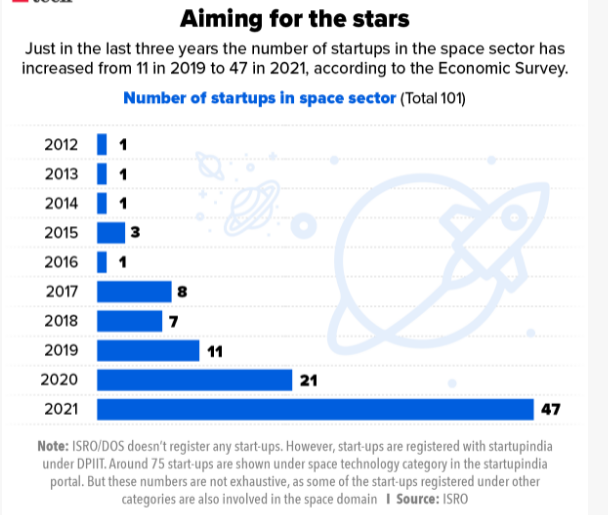PERSPECTIVE| THE INDIAN SPACE POLICY 2023
Context
- Under this policy, ISRO has been asked to transfer mature systems to the industry for commercial exploitation.
- The policy states that ISRO, as the national space agency, will focus primarily on the research and development of new space technologies and applications and on expanding human understanding of outer space.
About
- The Policy thrust on privatization will enable the space sector to be more innovative and sustainable.
- It is crucial if India wants to be competitive in global space ecosystems.
- The space sector has remained within the confines of Indian Space Research Organization (ISRO) with full budgetary support from the government.
Vision of the policy
- To augment space capabilities; enable, encourage and develop a flourishing commercial presence in space.
- Use space as a driver of technology development and derived benefits in allied areas.
- Pursue international relations, and create an ecosystem for effective implementation of space applications among all stakeholders
- Protection of environment and lives, pursuing peaceful exploration of outer space, stimulation of public awareness and scientific quest
.jpeg)
Status of India’s space sector
- The global space economy is estimated at ~US$ 423 billion. Currently, India constitutes 2-3% of the global space economy.
- India is the sixth-largest player in the industry internationally having 3.6% of the world’s space-tech companies (as of 2021).
- As of 2021, India has 368 private space firms, making it fifth in the world after the US, the UK, Canada and Germany.

READ: https://www.iasgyan.in/daily-current-affairs/indias-space-sector
Strategy of the policy
- In pursuance of the vision set out for the space sector, Government seeks to pursue a holistic approach by encouraging and promoting greater private sector participation in the entire value chain of the Space Economy, including in the creation of space and ground-based assets.
- Thus, Indian consumers of space technology or services (such as communication, remote sensing, data-services, launch-services, etc), whether from public or private sectors, shall be free to directly procure them from any source, whether private or public.
Why Private Sector participation is important?
- Itwill allow ISRO to focus more on new technologies, exploration missions and human spaceflight programme.
- Promoting the private sector will enable the Indian space program to remain cost competitive within the global space market, and thus create several jobs in the space and other related sectors.
- Optimizing the utilization of space assets such as satellites and launch capacity by determining accountability amongst various stakeholders.
- Creation of new assets to be made contingent on confirmation of demand from user agencies/ entities.
Details of the ISP 2023
Permit to NGEs:
- It permits non-government entities (NGEs) to offer national and international space-based communication services, through self-owned, procured or leased geostationary orbit (GSO) and non-geostationary satellite orbit (NGSO) satellite systems.
Note: NGSO is a reference to low earth orbit or medium earth orbits that are home to satellites providing broadband internet services from space.
Ground Facilities:
- The policy also encourages NGEs to establish and operate ground facilities for space objects operations, such as telemetry, tracking and command (TT&C) Earth Stations and Satellite Control Centres (SCCs).
End to End Activities:
- It also allows NGEs to undertake end-to-end activities in the space sector through the establishment and operation of space objects, ground-based assets and related services such as communication, remote sensing and navigation.
Use of resources:
- It encouraged NGEs to use Indian orbital resources and/or non-Indian orbital resources to establish space objects for communication services over India and outside.
Operations and Manufacturing:
- The policy encouraged NGEs to manufacture and operate space transportation systems, including launch vehicles, shuttles, as well as design and develop reusable, recoverable and reconfigurable technologies and systems for space transportation.
Commercial recovery:
- It also encouraged NGEs to engage in the commercial recovery of an asteroid resource or a space resource.
Massive shortage of personnel
- The department-related Parliamentary Standing Committee on Personnel, Public Grievances, Law, and Justice said that a total of 1,709 posts are vacant in the CBI, against its sanctioned strength of 7,295.
- This leads to an inevitable conclusion that the Central Bureau of Investigation (CBI) is facing a massive shortage of personnel".
- This may increase pendency, hamper the quality of investigations and ultimately reduce the effectiveness and efficiency of the agency
Note: "Any NGE engaged in such a process shall be entitled to possess, own, transport, use, and sell any such asteroid resource or space resource obtained in accordance with applicable law, including the international obligations of India,"
Recent Developments in India’s Space Sector
- Created IN-SPACe, as a single-window, independent, nodal agency. Provide a stable regulatory and policy environment.
- Enhancing the role of New Space India Ltd (NSIL): NSIL to act as the exclusive public-sector aggregatorfor both demand and supply of space assets/ services on a commercial basis, including imaging, communication transponders, launch services.
READ: https://www.iasgyan.in/daily-current-affairs/indian-national-space-promotion-and-authorization-in-space

Focus areas for Government
- Encouraging advanced Research & Development in space sector to sustain and augment the space program.
- Providing public goods and services using space technology for national priorities.
- Creating a stable and predictable regulatory framework to provide a level playing field to Non-Government Entities in the Space sector through IN-SPACe.
- Promoting space-related education and innovation, including support to space-sector start-ups.
- Using space as a driver for overall technology development, nurture scientific temperament in the society, and increase awareness on space activities.
Impact of reforms
- New Indian Space Association has been created to function as the advisory and advocacy group for the Space industry.
- On 28 February 2021, NSIL conducted its first commercial launch which put19 satellites into orbit on the PSLV-C51 launch vehicle, including 4 satellites through IN-SPACe.
- Industries, start-ups, and academia have welcomed space sector reforms, and the new IN-SPACe mechanism.
READ: https://iasgyan.in/daily-current-affairs/space
Roles and Responsibilities
Non-Governmental Entities
- Offer national and international space-based communication services,
- Establish and operate remote sensing satellite systems within and outside india through selfowned or procured or leased satellites,
- Develop space situational awareness capabilities for enhancing observation, modelling and analysis.
- Undertake any other in-space prescribed commercial space activity etc.
IN-SPACe- Indian National Space Promotion & Authorisation Centre.
- IN-SPACe shall function as an autonomous Government organization, mandated to promote, hand-hold, guide and authorize space activities in the country.
- For this purpose, IN-SPACe shall periodically issue guidelines and procedures, that would among other things promote ease of doing business.
- The establishment and/or operations of space object(s);
- The launch and operation of launch vehicles including sub-orbital launches;
- The establishment and operation of launch pads which could be self-owned, leased or be a mobile platform.
- The planned re-entry of space objects with or without recovery.
Indian Space Research Organization
- ISRO, as the National Space Agency, will focus primarily on research and development of new space technologies and applications, and for expanding the human understanding of outer space.
NewSpace India Limited
- Be responsible for commercialising space technologies and platforms created through public expenditure.
- Manufacture, lease, or procure space components, technologies, platforms and other assets from private or public sector, on sound commercial principles.
- Service the space-based needs of users, whether government entities or NGEs, on sound commercial principles.

Applicability and Implementation:
- This policy is applicable to any space activity to or from Indian Territory or within the jurisdiction of India including the area to the limit of its exclusive economic zone.
- Notwithstanding anything contained in this policy, GoI reserves its right to provide exemptions to the provisions contained herein on a case-to-case basis.
Closing remarks
- AatmaNirbhar Bharat's vision calls for a significant revamp of government-led space activities to make it a reality.
- India needs a space law to support a thriving domestic space industry and the vision of the country's expanding participation in the global space economy.
- As ISRO certainly can’t meet India’s rising demand for space-based services more than ever.
- Therefore, it is essential to provide a favourable policy environment to encourage private sector investment.
Citations:
https://www.ibef.org/blogs/opening-up-new-opportunities-in-the-indian-space-sector
https://www.thehindu.com/sci-tech/science/indian-space-policy-isro-to-focus-on-rd/article66761773.ece
https://www.thehindubusinessline.com/news/science/cabinet-gives-nod-to-indian-space-policy-2023/article66708202.ece
https://www.isro.gov.in/media_isro/pdf/IndianSpacePolicy2023.pdf
https://sansadtv.nic.in/show_type/perspective




